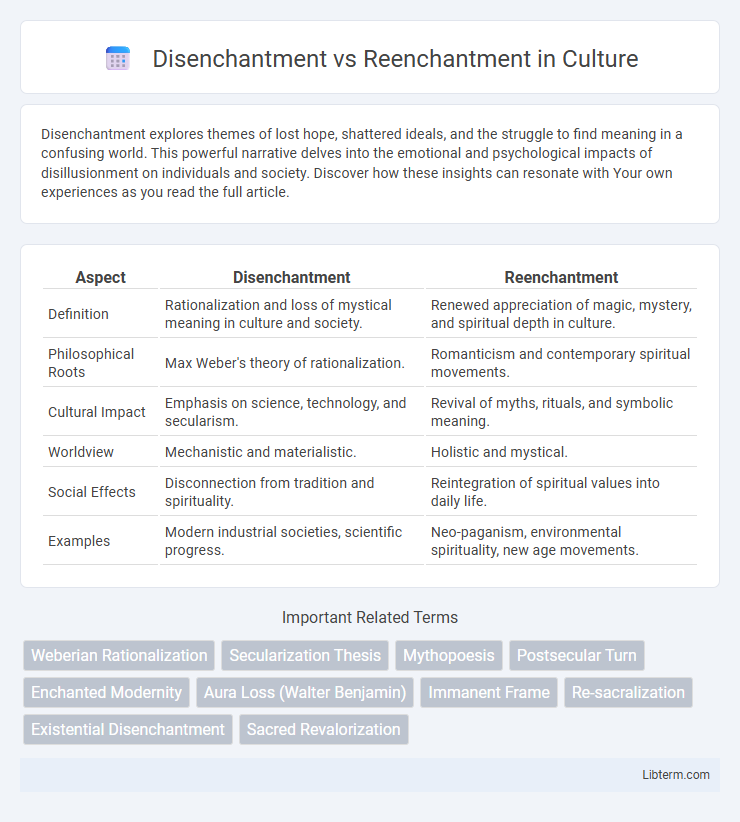Disenchantment explores themes of lost hope, shattered ideals, and the struggle to find meaning in a confusing world. This powerful narrative delves into the emotional and psychological impacts of disillusionment on individuals and society. Discover how these insights can resonate with Your own experiences as you read the full article.
Table of Comparison
| Aspect | Disenchantment | Reenchantment |
|---|---|---|
| Definition | Rationalization and loss of mystical meaning in culture and society. | Renewed appreciation of magic, mystery, and spiritual depth in culture. |
| Philosophical Roots | Max Weber's theory of rationalization. | Romanticism and contemporary spiritual movements. |
| Cultural Impact | Emphasis on science, technology, and secularism. | Revival of myths, rituals, and symbolic meaning. |
| Worldview | Mechanistic and materialistic. | Holistic and mystical. |
| Social Effects | Disconnection from tradition and spirituality. | Reintegration of spiritual values into daily life. |
| Examples | Modern industrial societies, scientific progress. | Neo-paganism, environmental spirituality, new age movements. |
Understanding Disenchantment: Origins and Meaning
Disenchantment refers to the process by which the world is perceived as less mysterious and supernatural, grounded in rationality and scientific understanding since the Enlightenment. Rooted in Max Weber's concept of "Entzauberung," disenchantment describes the decline of magical, religious, and mystical explanations in favor of logic and empirical evidence. This shift has transformed social and cultural perspectives, emphasizing secularization and the prioritization of objective knowledge over myth and tradition.
The Rise of Rationality and Secularization
The rise of rationality and secularization marks a significant shift from disenchantment, characterized by the decline of magical and religious worldviews toward empirical and scientific understanding. This transition emphasizes logic, reason, and evidence-based knowledge, undermining traditional beliefs tied to mysticism and supernatural explanations. Yet, reenchantment reemerges as a cultural response, blending spirituality with modernity and challenging the exclusive dominance of secular rationality.
Key Philosophers Behind Disenchantment
Max Weber stands as the central philosopher behind the concept of disenchantment, describing it as the process through which the modern world shifts from a magical and mythic interpretation to one governed by rationality and scientific understanding. Friedrich Nietzsche and Karl Marx also influenced disenchantment by critiquing traditional values and exposing underlying socioeconomic and moral structures, respectively. Weber's analysis highlights the transition from an enchanted worldview to one dominated by bureaucratic rationalization and secularization.
The Era of Reenchantment: Definition and Significance
The Era of Reenchantment marks a cultural and philosophical shift characterized by renewed interest in spirituality, mythology, and the mystical aspects of human experience. Reenchantment challenges the rationalism and disenchantment of the Enlightenment by embracing symbolic narratives, ecological awareness, and alternative epistemologies. This movement holds significant implications for redefining meaning, identity, and connection in contemporary society through a synthesis of tradition and innovation.
Cultural Movements Fueling Reenchantment
Cultural movements fueling reenchantment emphasize mystical experiences, ecological awareness, and spiritual revival as counterpoints to the rationalization and secularization characteristic of disenchantment. These movements draw from indigenous traditions, New Age spirituality, and eco-activism to restore a sense of wonder, interconnectedness, and sacredness to everyday life. By integrating symbolic rituals, mythic storytelling, and holistic worldviews, reenchantment challenges the dominance of scientific materialism and reaffirms the cultural importance of enchantment.
Disenchantment in Modern Society: Evidence and Effects
Disenchantment in modern society manifests through the decline of traditional beliefs and a growing reliance on scientific rationality, leading to a loss of magic and mystery in daily life. Evidence includes decreased religious participation, secularization trends, and an emphasis on technological progress replacing spiritual explanations. This shift impacts social cohesion by fostering individualism, weakening communal rituals, and altering perceptions of meaning and purpose.
Reenchantment Through Spirituality and Myth
Reenchantment through spirituality and myth revitalizes a sense of wonder and meaning in the modern world by reconnecting individuals with transcendent experiences and symbolic narratives. Mythic stories and spiritual practices create frameworks that transcend materialism, fostering deeper purpose and communal belonging. This process counters disenchantment's rationalization and secularization by re-infusing life with mystery, sacredness, and transformative significance.
Disenchantment vs Reenchantment: Main Differences
Disenchantment refers to the process of rationalization and loss of magical or spiritual meaning in the modern world, characterized by scientific explanation and secularization. Reenchantment, in contrast, involves a renewed sense of wonder, mysticism, and spiritual significance, often emerging as a reaction against the perceived emptiness of disenchantment. The main differences lie in their approach to meaning: disenchantment emphasizes reason and empirical understanding, while reenchantment embraces mystery, spirituality, and symbolic interpretation.
Why Reenchantment Matters in Contemporary Life
Reenchantment matters in contemporary life because it restores a sense of wonder and meaning lost in the modern worldview characterized by disenchantment and scientific rationalism. It fosters deeper connections to culture, nature, and spirituality, helping individuals find purpose amid technological and societal complexities. Embracing reenchantment supports mental well-being by encouraging imagination, creativity, and a renewed appreciation for the mysteries of existence.
The Future: Balancing Disenchantment and Reenchantment
The future requires a delicate balance between disenchantment, characterized by rationality, scientific progress, and skepticism, and reenchantment, which reintegrates meaning, spirituality, and emotional depth into human experience. Embracing disenchantment drives innovation and empirical understanding, while reenchantment fosters community, purpose, and holistic well-being. A sustainable future hinges on harmonizing these forces to cultivate both technological advancement and profound human connection.
Disenchantment Infographic

 libterm.com
libterm.com